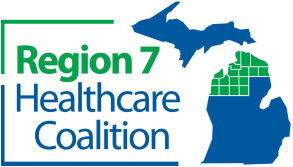|
December's Pediatric Champion Office Hours Reminder
December’s Pediatric Champion Office Hours are cancelled due to the Holidays. Have a safe and wonderful Holiday Season. Office Hours will resume on January 30, 2024. Pediatric Disaster Response and Emergency Preparedness (MGT-439) September 25-26, 2024 The Region 8 Healthcare Coalition is pleased to offer Pediatric Disaster Response and Emergency Preparedness. The course addresses pediatric emergency planning and medical response considerations through a combination of lectures, small group exercises, and a table-top exercise. It prepares students to effectively, appropriately, and safely plan for and respond to a disaster incident involving children, addressing the specific needs of pediatric patients in the event of a community based-incident. Pediatric specific planning considerations include mass sheltering, pediatric-triage, reunification planning and pediatric decontamination considerations. This is not a hands-on technical course, but instead a management resource course for stakeholders like pediatric physicians, emergency managers, emergency planners, and members of public emergency departments like EMS, Fire, Police, Public Health, and Hospitals in field of disaster response and preparedness work. For more information and to register for this course visit MI-TRAIN, course number 1055362. MI-TRAIN Registration Instructions Strategies to Include Maternal and Child Health in Emergency Planning This blog post from the Association of State and territorial Health Officials (ASTHO), in partnership with CDC’s National Center on Birth Defects and Developmental Disabilities (NCBDDD) discusses inclusion of maternal and child health (MCH) in infectious disease emergency preparedness and response in states and territories. Those interviewed described experiences in different jurisdictions and emergency responses. It is worth noting that there were common factors across various types of jurisdictions including the need for sustainable funding to support collaboration, intentional inclusion of MCH programs and staff in emergency response, improved data quality and surveillance systems, and open communication with partners and the public. To Read the Full Article Comments are closed.
|
Archives
July 2024
Categories |
To activate the Region 7
Medical Coordination Center call:
Gaylord Regional
Communication Center
1-989-732-5141
During your call, include the following information:
- Your name and contact number.
- Your agency or hospital.
- The reason for requesting the resource.
- Exact location to where you need the resource delivered.
- Who will accept and sign for the resource.
Medical Coordination Center call:
Gaylord Regional
Communication Center
1-989-732-5141
During your call, include the following information:
- Your name and contact number.
- Your agency or hospital.
- The reason for requesting the resource.
- Exact location to where you need the resource delivered.
- Who will accept and sign for the resource.
Site Map |
Organization |
Copyright © 2014 | 2464 Silver Fox Trail Suite A, Gaylord MI 49735 | 989.748.4975
|
 RSS Feed
RSS Feed
